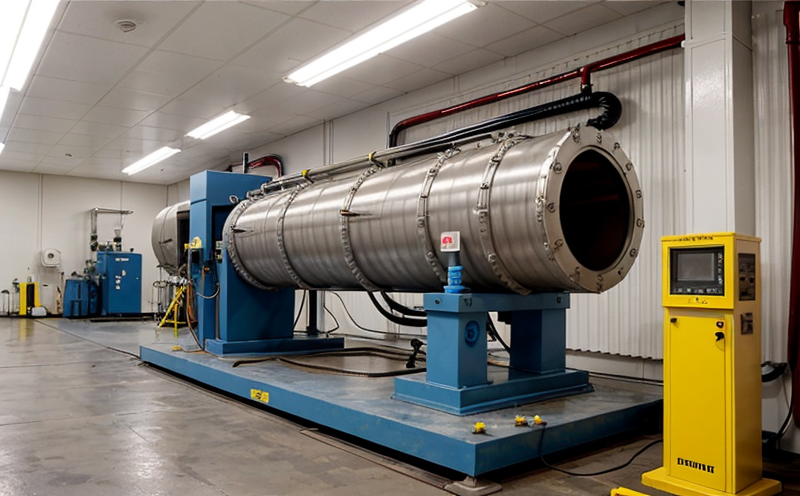ASTM C1349 Characterization of Curium in Nuclear Fuels
The ASTM C1349 standard is a critical tool used to characterize the presence and concentration of curium (Cur) in nuclear fuels. This test method is particularly important for ensuring that fuel materials meet stringent quality and safety standards, especially given the unique properties and potential hazards associated with curium.
Curium, a transuranic element, has significant applications in nuclear fuel technology due to its ability to contribute to the fission process. It is often used as an additive to enhance fuel performance. However, accurate characterization of curium content is essential for several reasons:
- To ensure compliance with international and national regulations governing the use and disposal of radioactive materials.
- To optimize fuel performance by ensuring a consistent and predictable contribution from curium in the fission process.
- To safeguard against potential contamination or impurities that could affect nuclear reactor safety and efficiency.
ASTM C1349 specifies procedures for analyzing the isotopic composition of curium using instrumental neutron activation analysis (INAA). This method involves exposing a sample to a neutron flux, followed by the measurement of gamma-ray emissions from the induced radioisotopes. The resulting data provides precise information on the amount and type of curium present in the fuel matrix.
The test procedure outlined in ASTM C1349 is designed to be robust and repeatable, ensuring that results are reliable across different laboratories and testing environments. This standardization is crucial for maintaining consistency in nuclear fuel quality assurance programs worldwide.
Proper specimen preparation is a critical step before conducting the ASTM C1349 test. Specimens must be prepared according to specified protocols to ensure accurate measurement of curium content. The sample should be homogenized and divided into aliquots, with care taken to avoid introducing any contamination that could skew results.
Instrumentation used in this test typically includes a high-resolution gamma-ray spectrometer capable of detecting the specific isotopic signatures of curium. Calibration against known standards ensures accurate quantification of the measured emissions. The testing environment must also meet strict safety and containment requirements to handle radioactive materials safely.
The results from ASTM C1349 are reported in terms of curium content, expressed as parts per million (ppm) or similar units depending on the specific application. These data points serve various purposes, including fuel formulation optimization, regulatory compliance verification, and safety assessment.
Understanding the isotopic composition of curium within nuclear fuels is vital for optimizing reactor performance and ensuring safe disposal practices. By adhering to ASTM C1349, laboratories can provide accurate and reliable information that supports these critical objectives.
Applied Standards
The ASTM C1349 standard has been widely adopted by organizations involved in the nuclear fuel industry. Its application is particularly relevant for entities such as:
- Nuclear power plant operators, who rely on accurate curium content data to enhance reactor efficiency and safety.
- Research institutions focused on advanced nuclear technologies, where precise characterization of curium is essential for developing new fuel formulations.
- Regulatory bodies responsible for enforcing radiation protection measures and ensuring compliance with international standards.
The standard also aligns with broader regulatory frameworks such as those outlined in ISO 17025, which governs the competence of testing and calibration laboratories. By adhering to ASTM C1349, laboratories demonstrate their adherence to these higher standards of quality assurance.
International recognition of ASTM C1349 ensures that results from this test are accepted across various jurisdictions, facilitating global collaboration in nuclear fuel research and development.
Why Choose This Test
- Precision Measurement: ASTM C1349 offers a highly precise method for quantifying curium content, which is crucial for optimizing fuel performance and ensuring regulatory compliance.
- Safety Assurance: By accurately characterizing curium in nuclear fuels, this test helps mitigate risks associated with radiation exposure and contamination.
- Regulatory Compliance: This method ensures that nuclear fuel meets stringent regulatory requirements set by international standards organizations like ISO and IAEA.
- Innovation Support: Providing reliable data on curium content supports research and development efforts aimed at improving reactor efficiency and safety.
The ASTM C1349 test is a cornerstone of nuclear fuel quality assurance, offering unparalleled accuracy in measuring curium content. This precision is vital for maintaining the integrity of nuclear fuel cycles and ensuring that nuclear technology continues to evolve safely and effectively.
Customer Impact and Satisfaction
The ASTM C1349 test method has a direct impact on customer satisfaction by providing reliable, accurate, and reproducible data on curium content in nuclear fuels. This is essential for customers involved in:
- Nuclear Power Generation: Operators rely on precise curium measurements to ensure optimal reactor performance and safety.
- R&D Institutions: Researchers use these results to refine fuel formulations and explore new applications of curium in nuclear technology.
- Regulatory Agencies: Compliance officers need accurate data to verify that nuclear fuels meet stringent regulatory standards.
The test's ability to deliver consistent, high-quality results enhances customer confidence in the reliability of nuclear fuel products. This, in turn, fosters long-term partnerships and supports the continuous improvement of nuclear technologies.
By choosing ASTM C1349 testing services, customers benefit from:
- Enhanced Safety: Accurate curium content ensures that nuclear fuels meet stringent safety requirements.
- Informed Decision-Making: Reliable data supports informed decisions regarding fuel performance and reactor optimization.
- Compliance Assurance: Results align with international standards, ensuring regulatory compliance.
These benefits contribute to greater customer satisfaction and trust in the quality of nuclear fuels.





